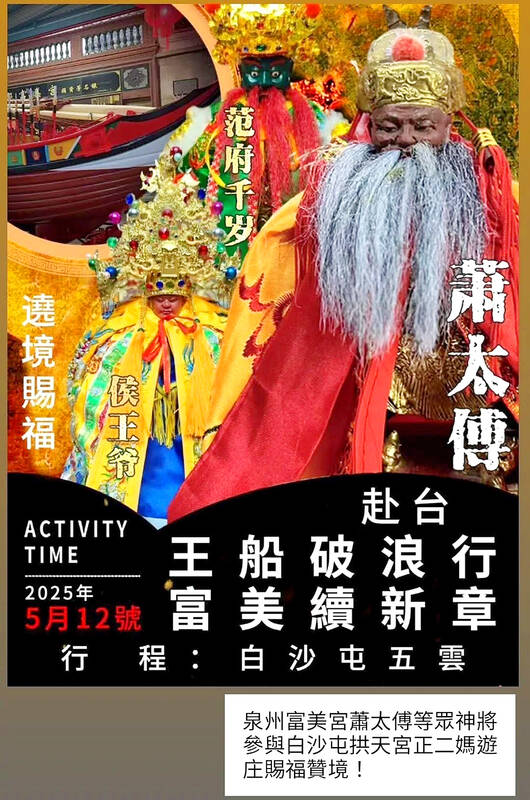The Mainland Affairs Council (MAC) yesterday said it is taking a closer look at the activities of a temple from China conducting a pilgrimage across Taiwan, after it prompted concerns of “united front” activities.
A local resident yesterday said the Fumei Temple (富美宮) from Quanzhou in China’s Fujian Province is escorting the statue of Taoist deity Xiao Taifu (蕭太傅) on a pilgrimage in Taiwan from May 3 to Wednesday, which includes visiting temples in central and southern Taiwan, the Xiao Family Association and the Baishatun Matsu Pilgrimage.
Every year after the Matsu (媽祖) statue of Gongtian Temple (拱天宮) in Miaoli County’s Baishatun (白沙屯) returns from Chaotian Temple (朝天宮) in Yunlin County’s Beigang Township (北港), two other Matsu statues from Baishatun carry out a village tour, and their route is considered the Baishatun Matsu’s jurisdictional area, the resident said.

Photo: Screen grab from Facebook
Representatives of the Chinese temple are holding their pilgrimage in Taiwan and have contacted Baishatun Wuyung Temple (五雲宮) to attend the Baishatun Matsu’s village tour, they said.
That might mean they are “patrolling Baishatun and claiming it as their jurisdictional area,” they said.
During Fumei Temple’s 12-day pilgrimage in Taiwan, its representatives visited more than 30 temples across several counties, including Yunlin and Chiayi counties, and Taichung and Tainan.
Fumei Temple chairperson Chen Shu-xian (陳淑賢) has said letters were sent informing the temples in Taiwan before the visit, which said that in celebration of the 100th anniversary of the arrival of the King Boat (王船), the temple is escorting the Xiao Taifu deity statue to start a pilgrimage in Taiwan to extend the centuries-old belief and friendship.
National Cheng Kung University political science professor Hung Ching-fu (洪敬富) said that Ong Yah (王爺) belief is an important folk religion in Taiwan, aside from Matsu and Guangong (關公), and the Quanzhou temple worshiping an Ong Yah surnamed Xiao, visiting Taiwan and attending the Baishatun Matsu Pilgrimage might have hidden motives.
Taiwanese have strong religious beliefs, so when Chinese temples want to join religious events, local temples usually would not refuse, but the Chinese Communist Party (CCP) promotes atheism, so religious exchanges from China usually have political or other agendas, he said.
Fumei Temple is holding its pilgrimage in Taiwan, but it might also invite Taiwanese to take part in “united front” activities in China, he said.
The government should regulate the donations behind such “united front” activities held under the guise of “religious exchanges,” he added.
The MAC said the government did not receive any application from Fumei Temple before its representatives began their pilgrimage.
Authorities are gathering evidence to understand whether they deliberately avoided filing an application or applied with false information, the council said, adding that it would strictly investigate and deal with the case according to the law.
The CCP over the past few years has been conducting “united front” infiltration in Taiwan under the guise of religious exchanges to achieve political identification and promote integration and unification through religious identification, the council said.

The Coast Guard Administration (CGA) yesterday said it had deployed patrol vessels to expel a China Coast Guard ship and a Chinese fishing boat near Pratas Island (Dongsha Island, 東沙群島) in the South China Sea. The China Coast Guard vessel was 28 nautical miles (52km) northeast of Pratas at 6:15am on Thursday, approaching the island’s restricted waters, which extend 24 nautical miles from its shoreline, the CGA’s Dongsha-Nansha Branch said in a statement. The Tainan, a 2,000-tonne cutter, was deployed by the CGA to shadow the Chinese ship, which left the area at 2:39pm on Friday, the statement said. At 6:31pm on Friday,

The Chinese People’s Liberation Army Navy’s (PLAN) third aircraft carrier, the Fujian, would pose a steep challenge to Taiwan’s ability to defend itself against a full-scale invasion, a defense expert said yesterday. Institute of National Defense and Security Research analyst Chieh Chung (揭仲) made the comment hours after the PLAN confirmed the carrier recently passed through the Taiwan Strait to conduct “scientific research tests and training missions” in the South China Sea. China has two carriers in operation — the Liaoning and the Shandong — with the Fujian undergoing sea trials. Although the PLAN needs time to train the Fujian’s air wing and

STRIKE: Some travel agencies in Taiwan said that they were aware of the situation in South Korea, and that group tours to the country were proceeding as planned A planned strike by airport personnel in South Korea has not affected group tours to the country from Taiwan, travel agencies said yesterday. They added that they were closely monitoring the situation. Personnel at 15 airports, including Seoul’s Incheon and Gimpo airports, are to go on strike. They announced at a news conference on Tuesday that the strike would begin on Friday next week and continue until the Mid-Autumn Festival next month. Some travel agencies in Taiwan, including Cola Tour, Lion Travel, SET Tour and ezTravel, said that they were aware of the situation in South Korea, and that group

Taiwanese celebrities Hank Chen (陳漢典) and Lulu Huang (黃路梓茵) announced yesterday that they are planning to marry. Huang announced and posted photos of their engagement to her social media pages yesterday morning, joking that the pair were not just doing marketing for a new show, but “really getting married.” “We’ve decided to spend all of our future happy and hilarious moments together,” she wrote. The announcement, which was later confirmed by the talent agency they share, appeared to come as a surprise even to those around them, with veteran TV host Jacky Wu (吳宗憲) saying he was “totally taken aback” by the news. Huang,